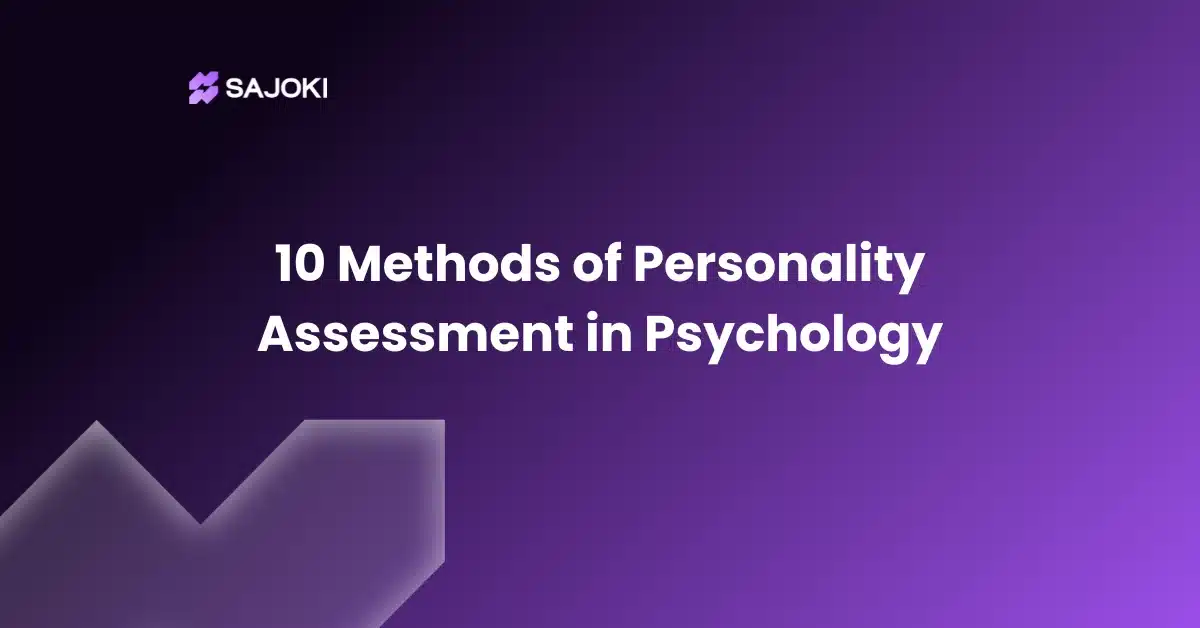Introduction
Personality assessment is a fundamental area of psychology that aids in the understanding of an individual’s behavior, thoughts, and feelings. It enables psychologists, researchers, and employers to scientifically investigate human traits. The assessments are used extensively in therapy, the hiring process, and self-development.
The main methods of personality assessment in psychology include self-report questionnaires, behavioral observations, case studies, projective tests, and psychophysiological methods. These tests are applied in the diagnosis of mental disorders, career choice, and improving interpersonal relationships.
In this blog, we will observe the primary methods through which personality assessment is carried out. We will discuss their significance, how they work, and how they are used in different settings. Let’s go!
What is Personality Assessment and its Role in Psychology
Personality testing is the scientific examination of an individual’s emotional patterns, habits, and traits. Personality testing allows psychologists to observe how people think, react, and interact in a variety of different situations. Personality tests find wide applications in research, counseling, and organizations.
Personality tests in psychology establish strengths, weaknesses, and habits. They are applied in diagnosing mental illnesses, career advice, and self-enhancement. Through the use of systematic testing methods, psychologists are able to understand human nature better.
10 Primary Personality Assessment Methods in Psychology
Some of the basic methods of personality assessment in psychology are mentioned below:
1. Self-Report Questionnaires
Self-report questionnaires are perhaps the most frequent method of personality measurement. These request that people respond to highly structured questions regarding their feelings, behavior, and thoughts.
- Standard and objective measurement of the personality traits is developed through tests.
- The answers are typically contrasted with a continuum (e.g., strongly agree-strongly disagree).
- Some of the most commonly employed self-report inventories are the Big Five Personality Test, Myers-Briggs Type Indicator (MBTI), and Minnesota Multiphasic Personality Inventory (MMPI).
2. Projective Tests
Projective tests are utilized to quantify personality through the process of subjecting the individual to uncertain stimuli and analyzing their response.
- They provide information about unconscious thoughts, sentiments, and conflict.
- Some standard projective procedures are the Rorschach Inkblot Test, Thematic Apperception Test (TAT), and Sentence Completion Test.
- They are utilized in psychoanalysis and therapy to gather full information about personality.
- They are hard to analyze and less structured in format than questionnaires asking for self-reports.
3. Behavioral Observations
Behavioral observation refers to the measurement of personality through observing a person’s behavior in front of our own eyes and interactions.
- Psychologists label how individuals behave within certain situations.
- They are utilized in child psychology, social behavior studies, and measurement of employment performance.
- They provide live evidence but are impacted by situations.
- Typically used in clinical assessment and teaching to deconstruct patterns of behavior.
4. Case Studies and Interviews
Case studies and interviews help psychologists gather in-depth information about an individual’s personality.
- Structured or unstructured interviews allow the measurement of traits and behavior.
- Case studies are comprehensive studies of the psychological past of an individual.
- Used in clinics to diagnose a condition and acquire information about the patient’s history.
- Provide qualitative information but can be time-consuming and are subject to bias.
5. Psychophysiological Methods
These methods involve the measurement of personality via physiological reactions such as heart rate, brain waves, and skin conductance.
- Use EEG (Electroencephalogram) and fMRI (Functional Magnetic Resonance Imaging) methods.
- Beneficial for studying emotional responses and stress-like traits.
- Provide objective data but require sophisticated equipment and techniques.
- Used in neuroscience and experimental psychology to link biological factors with personality traits.
6. Online AI-Based Personality Tests
Recent developments have been preceded by AI-based personality testing, such as SAJOKI, which analyzes behavior patterns using artificial intelligence.
- They are machine learning-based and forecast personality from answers as well as electronic interactions.
- Are capable of live analysis and use across HR, recruitment, as well as self-improvement.
- It offers greater accuracy and less human bias.
- Applicable for mass assessment for companies and in psychological research.
7. Situational Judgment Tests (SJTs)
Situational Judgment Tests assess personality by having the respondent respond to work or social scenarios. The respondent chooses the most appropriate response from a number of options, using their decision-making and interpersonal abilities.
- Tests how people respond to work problems and ethical dilemmas.
- Helps employers select candidates with great decision-making abilities.
- Identifies how well people collaborate and solve conflicts in a team setting.
- Reduces subjectivity by focusing on situational responses rather than self-reports.
8. Implicit Association Tests (IAT)
Implicit Association Tests investigate word and image categorizations using response latency to assess automatic biases. These tests may reveal implicit attitudes individuals have but are not consciously aware of.
- Determines automatic associations driving behavior and decision-making.
- Helps companies and psychologists study racial, gender, and social group bias.
- Prevents test-takers from giving socially desirable answers.
- Helps to reveal implicit motives and attitudes that affect daily interaction.
9. Narrative Identity Assessment
This method analyzes individual stories and life events to ascertain personality and growth. Individuals describe important life experiences, relationships, and values that make up their identities.
- Helps psychologists assess how individuals build their identities and personal growth.
- Provides insight into how life events influence mental health and personality.
- Aids in identifying coping strategies individuals employ to handle adversity and maintain emotional stability.
- Helps track changes in personality over time based on major life events.
10. Peer and 360-Degree Feedback
This method obtains personality ratings from peers, supervisors, and colleagues to provide a balanced evaluation. It is typically implemented in the workplace for career development.
- Seeks feedback from different individuals to form a balanced opinion.
- Indicates strengths and weaknesses of communication and collaboration.
- Helps people realize areas where they need to develop and improve.
- Delivers an unbiased assessment with the help of different opinions instead of relying on self-reports.
Existing Content Relevance:
10 Best Pre-Employment Personality Tests
Best Personality Tests for Team Building
10 Applications of Personality Assessment
Personality assessment is becoming a major part of various sectors in our day-to-day life. Some of the applications of the personality assessment are mentioned below:
1. Clinical Psychology and Diagnosis
Personality tests facilitate the diagnosis of psychological disorders like anxiety, depression, and personality disorders. They are employed by professionals to design treatment plans for an individual to meet his/her psychological needs.
2. Occupational Psychology and Career Counseling
Personality tests help individuals select appropriate careers based on their strengths, interests, and work habits. They are employed by companies for employment matching of applicants with vacant positions.
3. Employee Recruitment and Talent Management
Personality tests are used by companies to gauge the work ethic, leadership skills, and company fit of applicants. Recruiting is made more efficient with AI tools like SAJOKI.
4. Personal Knowledge and Development
Individuals utilize personality tests to know themselves, develop on their strengths, and work on their weaknesses. They are used in the context of professional and personal objectives.
5. Student Development and Educational Psychology
Personality tests are utilized by educators and counselors to identify the emotional intelligence, intellectual abilities, and learning styles of students. They are utilized in order to individualize learning plans.
6. Relationship Counseling and Conflict Resolution
Personality tests enable relationship counseling by establishing compatibility of people, communication styles, and emotional responses in relationships.
7. Leadership and Team Building
Organizations use personality tests to identify leadership skills in employees and construct high-performing teams by combining complementary sets of skill and personality types.
8. Mental Health Research and Neuroscience
Psychologists and neuroscientists use personality tests to study mental health trends, emotion regulation, and behavior change in individuals over time.
9. Forensic and Criminal Psychology
Personality tests help in criminal profiling, establishing behavioral tendencies, and screening legal candidates for cases such as custody battles and criminal proceedings.
10. Marketing and Consumer Behavior Analysis
Personality tests are used by marketers to understand consumer behavior, tailor advertising, and create targeted marketing campaigns according to psychological profiles.
Frequently Asked Questions (FAQs)
Are personality tests always correct?
Personality tests provide useful information, yet accuracy depends upon the test, honesty in answers, and accurate interpretation.
Can personality change?
Yes, personality can be altered by experience, environment, and self-development.
How is personality best assessed?
There isn’t a best way; it just varies with the situation. Self-report tests are standardized, but projective tests reveal more depth.
Are internet personality tests accurate?
AI software developers create valid tests, but online and free versions do not always need to undergo scientific testing.
Do personality tests contribute in the management of mental disorders?
Yes, they are employed by therapists in making diagnoses, monitoring progress, and tailoring sessions.
Conclusion
To achieve professionalism and success as an individual, one must realize personality. The methods of personality assessment in psychology provide critical insight into behavior, emotional awareness, and intellect.
From self-test tests to SAJOKI-type artificial intelligence-based tests, they are used in career guidance, psychotherapy, and corporate management. Investments in personality testing leads to better decision-making, better teams, and increased self-awareness.
Individuals and organizations can realize their full potential and enjoy a more balanced working and social life by using scientific approaches.














